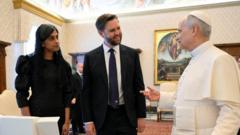The decision underscores the Vatican's ongoing adherence to a controversial 2018 agreement with Beijing, impacting the Catholic Church within China.
Pope Appoints First Chinese Bishop, Continues Vatican-Beijing Accord

Pope Appoints First Chinese Bishop, Continues Vatican-Beijing Accord
Pope Leo XIV's appointment of Auxiliary Bishop Joseph Lin Yuntuan reflects a commitment to strengthen ties between the Vatican and China.
In a notable move for diplomatic relations, Pope Leo XIV has appointed Joseph Lin Yuntuan as the first Chinese bishop during his papacy, reaffirming the Vatican's commitment to a landmark agreement with China. The appointment is seen as a significant step towards enhancing ties established under the 2018 accord initiated by the late Pope Francis, which allowed for Chinese governmental involvement in the selection of bishops—though its details remain largely undisclosed.
In China, where approximately 10 million Catholics reside, worshippers must navigate between state-sanctioned churches and underground congregations loyal to the Vatican. The Vatican announced that Lin Yuntuan's role is legally recognized under Chinese law, emphasizing the cooperative spirit fostered by ongoing dialogue with Chinese authorities.
Chinese Foreign Ministry spokesperson Lin Jian commented on the appointment, suggesting it reflects the smooth execution of the 2018 agreement and expressing China’s readiness to work with the Vatican to enhance bilateral relations. Michel Chambon, a research fellow focused on the Catholic Church in Asia, stated that the Pope's decision signals an inclination towards reconciliation rather than conflict in the ongoing relationship with China.
This diplomatic approach resonates with historical patterns, as the Vatican’s ties with China have been fraught with challenges since 1951, when diplomatic relations were severed. It was only during the 1980s that Catholic congregations began to emerge from underground following a period of severe repression under Mao Zedong's regime. The ongoing interactions under the current accord continue to shape the future of Catholicism in China.
In China, where approximately 10 million Catholics reside, worshippers must navigate between state-sanctioned churches and underground congregations loyal to the Vatican. The Vatican announced that Lin Yuntuan's role is legally recognized under Chinese law, emphasizing the cooperative spirit fostered by ongoing dialogue with Chinese authorities.
Chinese Foreign Ministry spokesperson Lin Jian commented on the appointment, suggesting it reflects the smooth execution of the 2018 agreement and expressing China’s readiness to work with the Vatican to enhance bilateral relations. Michel Chambon, a research fellow focused on the Catholic Church in Asia, stated that the Pope's decision signals an inclination towards reconciliation rather than conflict in the ongoing relationship with China.
This diplomatic approach resonates with historical patterns, as the Vatican’s ties with China have been fraught with challenges since 1951, when diplomatic relations were severed. It was only during the 1980s that Catholic congregations began to emerge from underground following a period of severe repression under Mao Zedong's regime. The ongoing interactions under the current accord continue to shape the future of Catholicism in China.




















